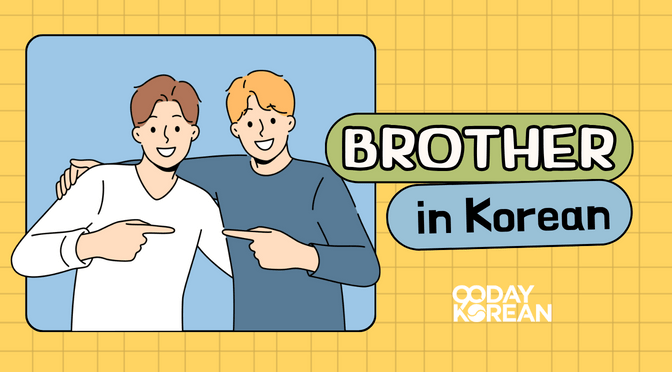
[ad_1]
At this time, we needed to take a deeper dive into the phrase for “brother” in Korean.

There are extra Korean phrases associated to “brother” than you suppose, and we’ll go over every of them on this article.
In case you have a male sibling or somebody who’s a brother, you’ll discover studying this new vocabulary helpful. Right here we go!
Easy methods to say “brother” in Korean
Initially, you must perceive that there’s a distinction relying on in case you are a feminine or a male speaker.
In case you are a feminine speaker, the phrase to make use of for giant brother is 오빠 (oppa). However in case you are a male speaker, the phrase for older brother is 형 (hyeong). Nevertheless, the phrase for youthful brother 남동생 (namdongsaeng) can be utilized by each genders. So, what determines which phrase you’ll use?
Pattern sentence:
우리 오빠를 벌써 만났어요? (uri oppareul beolsseo mannasseoyo?)
Did you already meet my brother?
Now, what if you wish to get formal with this phrase? The formal approach to make use of this phrase, in case you are male, is to name out your older brother with 형님 (hyeongnim). And, in case you are feminine, you’ll name out your older brother with 오라버니 (orabeoni). These phrases are not often utilized in on a regular basis conversations, however you might hear them sometimes in drama or motion pictures.
Under, we are going to go over some associated phrases. This may also allow you to perceive the purpose made within the above paragraph.
“Youthful brother” in Korean
The phrase for “youthful brother” within the Korean language is 남동생 (namdongsaeng). As you might discover, on this case, it doesn’t matter if the speaker is male or feminine. The phrase stays the identical.
The phrase 동생 (dongsaeng) expresses youthful sibling, whereas 남 (nam) designates it as a boy. The phrase 동생 (dongsaeng) will be additionally used for a youthful particular person that you’re very near, even in case you are not associated to.
In case you are speaking to your youthful brother instantly, you might select to make use of their identify as an alternative, although the phrase 동생 (dongsaeng) can also be not incorrect. Most Koreans use their youthful brother’s identify when calling them instantly. The phrases 동생 (dongsaeng) or 남동생 (namdongsaeng) are often for when speaking about one’s youthful brother to another person.
Pattern sentence:
내 남동생이 미국으로 유학을 갈 때가 그리울 거야. (nae namdongsaengi migugeuro yuhageul gal ttaega geuriul geoya.)
I’ll miss my little brother when he goes to review within the United States.
“Older brother” in Korean
Based mostly on the above, you’ll be able to maybe already guess that the phrase for “older brother” in Korean is 오빠 (oppa) when the speaker is feminine and 형 (hyeong) when the speaker is male. You need to use it with people who find themselves not associated to you, as nicely.
Certainly, additionally it is frequent for males to name male mates older than them 형 (hyeong), whereas girls name male mates older than them 오빠 (oppa). Additionally it is not unusual for ladies to name their important others 오빠 (oppa), though different phrases of endearment exist for that, as nicely.
“Stepbrother” in Korean
For stepbrother, too, there are a number of completely different phrases you should utilize. If they’re older than you and you’re male, you might use 의붓형 (uibutyeong). If they’re older than you and you’re feminine, you might use 의붓오빠 (uibudoppa). If they’re youthful than you, you might use 의붓동생 (uibutdongsaeng), no matter gender.
Pattern sentence:
일 년에 한 번씩 의붓오빠를 방문한다. (il nyeone han beonssik uibut oppareul bangmunhanda.)
I go to my stepbrother yearly.
“Half-brother” in Korean
If they’re older than you and you’re male, you might use 이복형 (ibokyeong). If they’re older than you and you’re feminine, you might use 이복오빠 (ibokoppa). If they’re youthful than you, you might use 이복동생 (ibokdongsaeng), no matter gender.
Pattern sentence:
이 사람은 제 이복동생이에요 (i sarameun je ibokdongsaengieyo.)
This particular person is my half-brother.
“Brothers” in Korean
Now, if you wish to communicate of multiple brother at a time, the phrase to make use of is 형제 (hyeongje).
“Brother-in-law” in Korean
Now, right here is the place it will get somewhat extra sophisticated. However we are going to attempt to make it so simple as attainable! Briefly, there are 11 completely different phrases for brother-in-law in Korean, primarily based on age, gender, and even marital standing.
| English which means | Korean |
|---|---|
| Husband’s older brother | 아주버님 (ajubeonim) |
| Husband’s older brother | 형님 (hyeongnim) |
| Husband’s youthful brother | 시동생 (sidongsaeng) |
| Husband’s married youthful brother | 서방님 (seobangnim) |
| Husband’s single youthful brother | 도련님 (doreyonnim) |
| Spouse’s older brother | 형님 (hyeongnim) |
| Spouse’s youthful brother | 처남 (cheonam) |
| Older sister’s husband (for males) | 매형 (maehyeong) |
| Older sister’s husband (for ladies) | 형부 (hyeongbu) |
| Youthful sister’s husband (for males) | 매제 (maeje) |
| Youthful sister’s husband (for ladies) | 제부 (jebu) |
Pattern sentence:
오늘은 처남과 저녁을 먹어. (oneureun cheonamgwa jeonyeogeul meogeo.)
At this time, I’ve dinner with my brother-in-law.
Wrap Up
And there you go, we now have completed studying the best way to say brother in Korean! Had been you shocked to search out on the market had been so many alternative phrases to know for it? For extra related content material, learn our article on 형 (hyeong), 언니 (eonni), 선배 (seonbae) and so forth!
And should you’d prefer to know the phrases for different instant relations, like your older and youthful siblings, mother and father, and grandparents, head on to our article on Korean Household Phrases!
Was this submit useful?
SureNo
[ad_2]